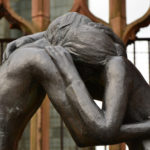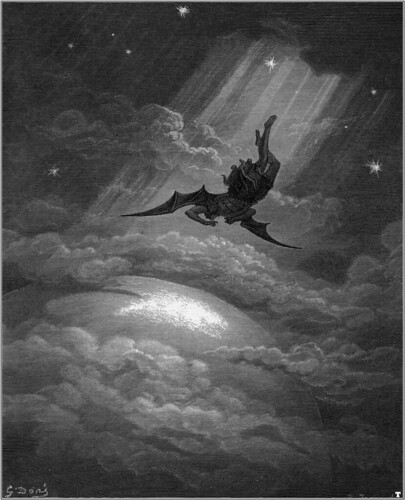We run our website the way we wished the whole internet worked: we provide high quality original content with no ads. We are funded solely by your direct support. Please consider supporting this project.
Our Beautiful, Nightmarish World
The Bible consistently proclaims that the creation reflects the glory of God. To me, the truth of this proclamation is undeniable. When I was younger I several times went on three-week solo backpacking trips into the mountainous forests of Montana. If gazing at the star studded sky on a moonless night at the peak of an 11,000 foot Montana mountain wouldn’t convince a person there’s a mind-bogglingly magnificent God behind this creation, I don’t know what would.
But the Bible and universal human experience also teach us that this “glory” isn’t the whole story.
That same God-glorifying starry sky looks down with indifference on terrified children sold into sexual slavery, war-torn countries, the ravages of disease, the aftermath of unimaginable natural disasters, and a planet that has known the incalculable suffering of events such the Holocaust and the genocide of Rwanda.
How can there be such a beautiful, nightmarish world? The biblical answer is that the world was created and is ultimately sustained by a beautiful God. But it has been seized and is now largely run by nightmarishly evil Powers.
A lot of people today, including a lot of Christians, find it hard to believe in things like Satan, rebellious angels and evil demons. And even some of those who say they believe in them feel awkward talking about them.
I empathize with this skepticism. Part of the reason for it, I suspect, is that we tend to think of Satan and demons as cartoon-like red entities with horns, hooves and pitchforks. These images are indeed mythic, borrowed mostly from pagan religions.
Nevertheless, while these images are mythic, there’s no reason to think that the evil realm they represent is mythic. The whole of the biblical narrative presupposes it’s real. Every aspect of Jesus’ ministry presupposes it’s real. Almost all people in all cultures throughout history have assumed this realm was real and often experienced it as real. And, in fact, there is a growing wealth of testimony from contemporary people, including a host of otherwise secular western anthropologists, that the supernatural realm is real, and that some of it is hostile.
I honestly don’t see how it is possible to explain how an all-good God could create a cosmos that is this screwed up without accepting that he’s opposed by forces of evil that operate on a cosmic scale. Appealing to human free will alone simply doesn’t cut it.
The world we live in looks like a war zone because the world we live in is a war zone. There is much that magnificently glorifies God, but there is also much that nightmarishly glorifies evil. An evil adversary and a rebel kingdom have seized the good creation. This adversary holds the earth and the humans who were supposed to rule it in bondage. Jesus came to change all this.
Jesus came to defeat the devil and end all his works (1 Jn 3:8; Heb 2:14). Through his life, ministry, death and resurrection he dealt a fatal blow to the powerful leader of the rebel regime and established a subversive revolution that he promised would ultimately end the enemy occupation and liberate the earth.
This is what Christianity is supposed to be. It’s not an orthodox club of people who believe all the right things. It’s not a holy club of people who always do all the right things. What Jesus rather came to establish was a movement of people who individually and collectively manifest the domain in which God is King and who revolt against every aspect of the domain in which Satan is king.
Category: Essays
Tags: Beauty, Essay, Evil, Kingdom, Kingdom Living, Satan, Warfare Worldview
Topics: Spiritual Warfare, Cosmic Conflict
Related Reading

The Coming Kingdom & Racial Conflict
In the book of Revelation, we see a glimpse into the future. John says he saw, …a great multitude that no one could count, from every nation, tribe, people and language, standing before the throne and in front of the Lamb. They were wearing white robes and were holding palm branches in their hands. And…

Five Brief Philosophical Arguments for the Open View
Introduction I believe that sound philosophical arguments support the open view in which God doesn’t foreknow the future free decisions of humans. My main reasons for holding this view are biblical and theological, but since truth is one we should expect that the truths of Scripture and the truths of reason will arrive at the…

Lies, Truth, and the Holy Spirit
The root of the flesh is a lie about who God is and who we are. Satan brings us into bondage of the flesh by convincing us that God is not the loving God he says that he is. In doing this, Satan convinces us that we cannot find fullness of life by being wholly…

Does Nonviolence Work?
The teaching of Jesus on nonviolence strikes many as ludicrous, impractical, unpatriotic, irresponsible, and possibly even immoral. “Surely Jesus expects us to take up arms against Muslim extremists to protect our country and families!” If I had a dollar for every time I’ve heard something like that response, I’d be a fairly wealthy man. The…

Lord Willing? Part 3
In this final segment of Greg’s discussion with Jessica Kelley about her book Lord Willing?, Jessica talks about how to respond to someone who is grieving or in crisis. You can find part 1 here and part 2 here. We’re so grateful that Jessica took the time to share her story with us. We know…

A Revelation of Beauty Through Ugliness
In my recent post, Getting Honest About the Dark Side of the Bible, I enlisted no less an authority than John Calvin to support my claim that we need to be forthright in acknowledging that some of the portraits of God in the OT are, as he said, “savage” and “barbaric.” What else can we…

